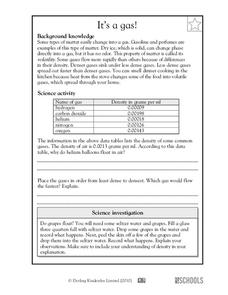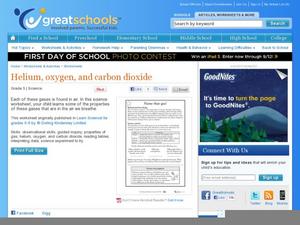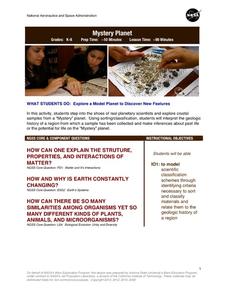Santa Monica College
The Density of Liquids and Solids
There are underwater rivers that flow on the ocean floor thanks to a difference in density. Scholars learn about the density in both liquids and solids in the second lesson of an 11-part series. They then determine the density of water,...
Cornell University
Bacteria Take Over and Down
Bacteria outnumber all other forms of life on Earth. Scholars observe the growth of bacteria in petri dishes to understand their role in maintaining good health. Then, they observe the growth of bacteria after they introduce...
Cornell University
Atomic Bonding
Explore the connection of surface area to bonding within atoms. Learners complete lab investigations to model changing surface area with different sizes and concentrations of atoms. A flour fireball demonstration follows the labs to...
Curated OER
It's A Gas!
Fifth graders complete a worksheet which has them place a list of gases in order from the least to the most dense. The density in grams is given for each. There's a good paragraph which provides background knowledge about the volatility...
Curated OER
Name That Gas!
Young scientists discover that air is a mixture of different gases - mainly nitrogen and oxygen. The properties of some of the other gases found in oxygen are listed in a table, then learners must decide which one of those gases is...
NASA
Mystery Planet
What can one learn about a planet based on a small surface sample? Learners will explore artifacts from a mystery planet and see what they can determine about the planet based on the evidence in front of them.
Virginia Department of Education
Partial Pressure
At some point, everyone has been under pressure—even Dalton! Explore Dalton's law of partial pressures with young chemists as they measure the volume of air extracted from a sample compared to its original volume. Class members perform...
Messenger Education
Cooling with Sunshades
Messenger's sun shade measures 8 ft x 6 ft and will have temperatures reaching 700 degree Fahrenheit on the outside while maintaining a cool 70 degrees underneath. In the third activity of four, groups discuss the basic properties of...
NOAA
Ocean Layers II
Now that you know the ocean has layers, let's name them. The seventh installment of a 23-part NOAA Enrichment in Marine sciences and Oceanography (NEMO) program covers terminology associated with ocean layers, such as thermocline and...
Curated OER
Air Pressure
Learners participate in a series of demonstrations about Bernoulli's principle. They explain how air pressure varies with air speed. They write a detailed lab report about the activity. This is a great way to explore this concept.
Santa Monica College
Single and Double Displacement Reactions
If you aren't part of the solution, you are part of the precipitate! Young chemists learn about single and double displacement reactions including precipitation reactions, neutralization reactions, and gas forming reactions. They perform...
University of Chicago
Don't Be Too Flaky
Snow, ice, and water are all composed of H2O. Does that mean they all have the same volume? Discover the ways that the densities of these substances determine their volumes, and how they change based on their current states of matter....
Curated OER
Water Cycle Reading and Writing
Here is a great way to get pupils to express a scientific concept in a fun way. After hearing the story of Walter the Water drop and learning facts about the water cycle, the class will write a creative expository piece describing what...
Curated OER
Bend It! Stretch It! Squash It!
Some items keep their shape no matter what happens! Have your kindergarten class choose which items would stay the same if they were bent, stretched, or squashed. The last activity prompts kids to see what happens when they stretch a...
Curated OER
Ice Cream Science
Students review properties of matter and discuss how materials change when things are done to them. They observe how materials change as a reaction to temperature by following the procedure to make ice cream and recording the temperature...
Curated OER
The Same But Different
Fourth graders identify the characteristics of a simple physical change. They describe objects by the properties of the materials from which they are made. Students discuss the different states of matter and their distinct physical...
Curated OER
The Penny Factory
Fourth graders identify the characteristics of a simple physical and chemical change. They describe objects by the properties of the materials from which they are made and separate or sort items using these properties. Students explain...
Curated OER
Resources - A Reading Guide
In this resources worksheet, students compare and contrast physical and chemical properties and changes. Students review the periodic table, pattern of atomic numbers and chemical reactivity. This worksheet has 56 short answer questions.
Curated OER
Chemistry Practice
In this chemistry practice worksheet, students select the correct response to the given questions. Students apply knowledge about the states of matter, finding vapor pressure and atmospheric pressure.
Curated OER
A Message in a Bottle
Learners investigate the motion of water currents by mapping the possible movement of messages cast into the ocean in bottles.They accurately plot the appearance of bottles on a world map and illustrate the flow of an ocean current...
Curated OER
The Structure of Materials
Students brainstorm what matter is and how they define it. They construct a water molecule with marshmallows and toothpicks. In addition, they watch videos to explore the use the idea of nanoscience to investigate the properties of...
Curated OER
Permafrost: Permanently Frozen Ground
Students explore permafrost. In this 3 states of matter lesson, students identify characteristics of solids and liquids. Students observe water and soil melting and freezing at various temperatures. Students make predictions about a...
Curated OER
Heating Crystals
Learners examine the effects of heating on various crystals. They formulate and revise scientific explanations and models using logic and evidence. Students work individually during this experiment.
Curated OER
Rate of Solution
Eighth graders determine the amount of agitation necessary to dissolve various sized sugar particles. This task assess students' abilities to collect, organize, and interpret data, create appropriate graphs, predict future events based...

























